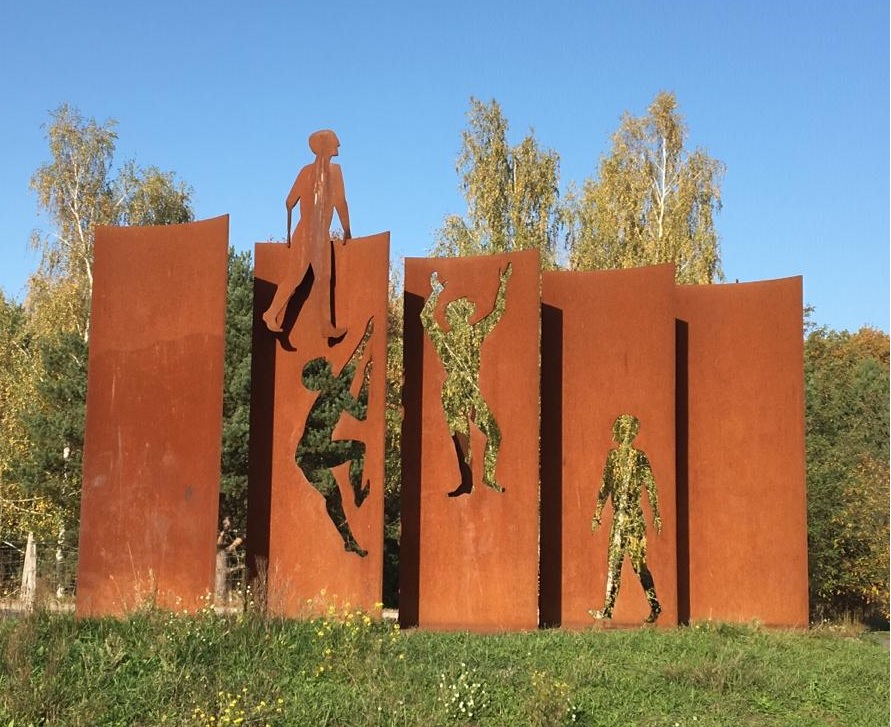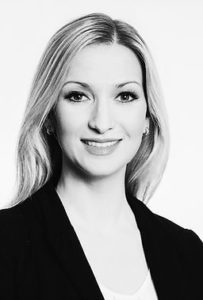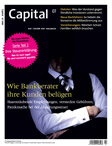An open conversation with the German lawyer Aleksandra Sinik. The virtual journey leads to Frankfurt am Main in Hesse, Germany – sense of justice in different European countries, comparing Germany and Bosnia, Serbia, Croatia – by Josefine Antonia Schulte, law student in Berlin
As part of the ABOWI project, an interview with lawyer Aleksandra Sinik, resident in Frankfurt am Main about her challenges in Germany and the global world. She explains how her roots from the former Yugoslavia influence her work, the different values of her compatriots in Germany sometimes do not fit, the need for reform of German law studies and her experiences in the globalized legal community.

ABOWI – a project that stands for „Across Borders With Information“ with a focus on the lawyers from all over the world, the cohesive members of the legal system. The ABOWI goal is to ask lawyers from 197 countries around the world about their legal education, legal decisions and the state of the law – what unites lawyers worldwide? Is digitalization affecting the legal profession? How is the globalization of the legal profession developing compared to Europe, Australia, America, China or Africa? Thanks to digitalization and the Internet, we travel virtually to every country. ABOWI – „Across Borders With Information“ – uses the internet and interviews people who are willing to share their experiences, visions and knowledge. We are looking for answers to the motivations and challenges of practicing lawyers – ABOWI asks!
JAS: Please introduce yourself briefly. Where do you live and work, and how long have you been practicing law?

My name is Alexandra Sinik, I am 38 years old and come from Frankfurt am Main. This is where I was born, grew up and studied. I was admitted to the bar by the bar association in Frankfurt. During my legal clerkship at the District Court of Frankfurt am Main, I worked, among others, at the Public Prosecutor’s Office in Frankfurt am Main and at the German Consulate General in Boston, USA. As a tax clerk and lawyer, I worked for an international accounting firm in Frankfurt am Main and London for more than 14 years. My family comes from the former Yugoslavia. I have been a self-employed lawyer for almost five years.
JAS 1: What made you decide to become a lawyer and do your family roots have anything to do with it?
I would say no, because I was also born in Frankfurt am Main. At home, only Serbian was spoken, but that was not the trigger. Nevertheless, as a child I noticed that two professions, lawyers and doctors, were particularly respected. Due to the fact that in our language the word ‚advocate‘ is used, the profession of lawyer sounds more important. I decided to become a lawyer only later, whether my childhood experiences unconsciously influenced me in the decision, I don’t know. During my training as a tax clerk, I decided to study law in addition because I did not want to work as a tax consultant all my life.
2 JAS: What is your focus in law?

I deal a lot with labor law, but I haven’t decided on a specific focus. I have noticed that some of my compatriots need legal assistance in their own language because they do not speak German well enough. As a result, I have decided to take on more and more mandates that are actually not in my field of law. I do this only if my feeling tells me that I can help safely and my time and energy for the research allow it. That’s why I more or less cross-dress many areas of law. To sum up, I would say that 40 percent of my work as a lawyer is related to employment law and 60 percent is mixed mandates involving numerous areas of law. In my opinion, it is no longer necessary to specialize in one area of law, as was the case in the past. Nowadays, thanks to various databases and modern research methods, you can get to grips with the relevant subject matter relatively quickly and advise the client correctly.
3. JAS: How is the social recognition of a legal career in Germany? (e.g., in my experience in Germany, social recognition is quite high, especially for people who have no points of contact with lawyers. There is certainly a stereotype of the superior and rich lawyer).
I see it the same way, in my opinion it is a typical status profession. The general population tends to rank lawyers one level higher socially than other academic professions. Nevertheless, I have the feeling and experience that this assessment is decreasing, over time one is seen somewhat more as a service provider. The professions of doctors and lawyers still compare well in this respect for me.
4 JAS: What is the sense of social justice in the different cultures?
You notice a clear difference between Bosnia and Germany, for example. I notice this especially when I ‚advise‘ my compatriots. Society in Bosnia has a different character and different values. Partly also with regard to the topic „Can I take what is not really mine“. I noticed this with a client who moved to Germany and is employed by an elderly gentleman. She cares for him and asked me if she could marry him so that his pension would not be forfeited. That’s not the point. We are all lifting the system together and if the gentleman passes away one day, the pension has to lapse, that is part of the system. Unless you’ve been married for a long time, then of course the wife is entitled to the widow’s pension. Often, in my experience, my compatriots have no sense that this kind of thing is socially wrong. After all, the system is not designed for someone to move in and then take the pension. This different feeling of the Croats/Serbs/Bosnians probably comes out of the hardship of how they have lived with war, poverty etc. Especially in the last years the local economy is very bad. In Germany, the sense of justice and the fact that you also want to function well as a society are a bit different. I can only speak from my own experience, many of the immigrants also come to Germany because they have failed locally, of course it is possible that so far I have met mainly less adaptable compatriots who have also escaped the system there.
5 JAS: What challenges do you face on a daily basis as a lawyer?
I find communicating legal expertise to clients difficult. People seeking advice often call and expect direct and immediate help. Everything has become so fast-paced. Phrases like, „Can’t you answer me quickly?“ are commonplace. The challenge is to explain how difficult this job is, not only in law in general, but especially related to the legal profession. There is not just one path and there are not just three options: A, B, and C. Rather, it depends on different factors in each case. You then have to talk about it for longer and then it’s more than a 15-minute phone call. One challenge is to make it clear to the person seeking advice that good advice consists of looking at the problem in great detail and then giving a really good opinion and assessment. Briefly outlining 15 options on the phone does not help the client.
It is also a challenge to have to explain the system to the client, especially if the client is concerned with the principle. I’ve had some clients who think they’re going to get justice in court and they want a business partner, for example, to confess to something in court just on principle. Many don’t understand that it is not the purpose of the system to teach someone a lesson by winning in court and feeling better. In my opinion, mediation would be more appropriate in some cases.
6. JAS: You are a lawyer in Germany, but at the same time you live in a globalized world. But how is the cooperation with lawyers and clients outside Germany?
Even though my experience in that regard is limited, my impression of the cooperation is quite positive. The colleagues in the respective countries have always been reliable, very polite, and in Serbia in particular this almost exaggerated politeness stands out. When working internationally, it is often the case that you communicate in the local language and then have it translated, because some of your colleagues don’t speak English very well. I noticed, especially with the colleagues from Dubai, that they sometimes spoke in a rather high-pitched manner, it often sounded somewhat exaggeratedly formal. In Germany, colleagues are often very brusque, but I usually get along well with them.
7. JAS: During my research, I saw that you speak Serbian, Croatian and Bosnian in addition to German and English, how come?
It sounds more than it is. You have to say that Croatian, Serbian and Bosnian are very similar languages. You can look at it like different dialects. I am not nationalistic and I just put it that way so that no one feels disadvantaged. I learned Serbian, Croatian and Bosnian as a child at home, because we did not speak German at home. I learned German in kindergarten and later in school, English was added. After school I spent a lot of time in English-speaking countries, which of course strengthened the language.
8. JAS: In your experience, how well positioned internationally are lawyers in terms of language?
Often not so well. English is still a problem for some lawyers, which is why, as I said before, a lot of communication and translation is done in the local language.
9. JAS: In your experience, how high is the demand for international cases and clients?
In Dubai and in the USA I had especially many Germans who still had problems with citizenship or various formalities, such as contracts regarding inheritance or tax problems. These cases were fun and very interesting.
10. JAS: From your experience in professional life, how meaningful is the decision to pursue a career in law? Would you choose it again?
Yes, I would choose it again, yet I am still frustrated with the system itself. The enormous knowledge requirement, so all the block knowledge, what you need for every exam then, like for example once everything from criminal law. I find it all very outdated, although it must be mentioned that this is currently being worked on. The training is very court-oriented, although almost all graduates become lawyers and only a few go on to become judges, which I think is a shame. On the other hand, all the training in the different areas still helps in everyday work. It helped me to have seen a lot from the judge’s perspective during my training, and then to end up working as a lawyer.
The training is important and I would choose it again, but I still think that some things need to be changed. If the basic interest is to work as a lawyer, of course you have to be aware that you have to work very precisely and carefully. For example, dealing with pressure in the form of deadlines and still being a good service provider, standing by the client’s side. It’s not always easy to meet all the factors, but if you can bring yourself to do it, I would recommend this career.
11. JAS: What advice would you give to law students or prospective students?
Interaction with others is hugely important. Especially using and practicing the legal language tool, discussing cases, and accurately communicating one’s thoughts. Students should start early to build a good structure already in their studies and not lose sight of what you want to do and when. Organization plays an essential role during and even after studies, especially in the legal profession.
12. JAS: How do you see the global market in the future? As you know, students in Germany have to specialize in a certain area of law at some point, do you think specializing in international law makes sense?
Personally, I have had contact with international law, but rather little. Although I have international contacts, especially from the time when I worked in London and made many contacts there, I find that almost all legal problems, unless you are in a large law firm, do not require international law. Most of the time, German law is sufficient. For lawyers working in my size range, I don’t think international law is that important. However, if you want to work in large law firms where you are dealing with the sometimes 4000-page contracts of internationally operating companies, it is definitely an advantage, if not essential.
I probably wouldn’t specialize in international law in law school. As I mentioned at the beginning, I don’t think too much of specializations in law school, because I believe that you only learn most of what you need to know in your job and in the practice that comes with it.
The fundamental problem I see in the legal profession is that everything is evolving via digitalization. With some clients who have come to me, I have thought that this problem could simply be Googled. However, clients often then find it difficult to transfer the situation of the problem described online, including a lawyer’s answer, to their own, because they are afraid, they have overlooked something important.
Nevertheless, I see the danger that the need will decrease in the future, because more and more computer-based evaluations will be developed. At least the small legal problems will be solved and accurately assessed in the future. More complex problems will always have to be answered by lawyers in the end, because laws are written in such a way that they need to be interpreted.
13 JAS: From your perspective, what needs to be done to bring lawyers from around the world together or is this process not necessary?
It is good when exchanges take place, especially because all countries are, after all, becoming more and more aligned over time. What used to be the ‚West‘ in terms of values etc. is now spreading to many other countries. Even Russia and and the former Yugoslavia are becoming more ‚Western‘ with time. I think that if we have more and more similar moral concepts and also the other value concepts fit together more and more, this can bring great advantages in politics. So that we come more quickly to a common denominator and are more likely to pull together. The exchange is important and should be promoted already in the university in cooperation with the universities of other countries. I have organized such an exchange through a friend who teaches at a university in Tennessee. Unfortunately, there is not much comparable so far and an international network is missing, during studies and in the job.
Many thanks to my interview partner Aleksandra Sinik, who answered my questions so honestly and openly. Another step towards breaking down prejudices and answering legal questions from people interested in law worldwide.
Conclusion: From theory to practice – law in transition – digitalization and globalization
Especially as a law student, the conversation with attorney Aleksandra Sinik was very exciting for me and makes it clear that there is still a lot to be done in the legal profession. A dusty, theoretical study with the current standard semester time of 10 semesters is a chunk worth swallowing according to Aleksandra Sinik. In the same way, the mentioned information transfer difficulties between clients and lawyers can be found in the everyday work of lawyers all over the world. Attorney Aleksandra Sinik noticed a lack of an international network of lawyers. She personally made the international contacts she needed on her own. Moreover, her experiences with immigrants to Germany were interesting and make me think.
„For simplicity, the masculine form is used throughout the text; the […] feminine form is of course included.“
V.i.S.d.P.:
stud. iur. Josefine Antonia Schulte
josefine.schulte@dr-schulte.de
Extension: 030-221922040
About ABOWI:
Across Borders With Information – ABOWI, an interview series by Josefine Schulte law student from Berlin in Germany. Questions and Answers: A journey around the world revealing differences and prejudices. What moves the lawyers of this earth, Josefine Schulte asks herself from Azerbaijan to Cyprus.
Contact us:
Dr. Schulte Rechtsanwalt
Malteserstrasse 170
12277 Berlin
Tel: +49 30 22 19 220 20
Fax. +49 30 22 19 220 21
Email: dr.schulte@dr-schulte.de
https://www.dr-schulte.de
PRESSCONTACT
Dr. Schulte Rechtsanwalt
Dr. Thomas Schulte
Malteserstrasse 170
12277 Berlin
Website: https://www.dr-schulte.de
E-Mail : dr.schulte@dr-schulte.de
Telefon: 030 22 19 220 20
Telefax: 030 22 19 220 21







